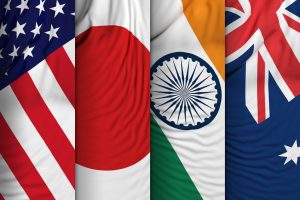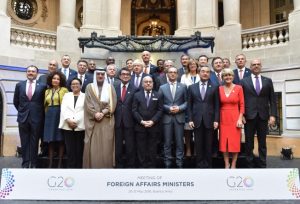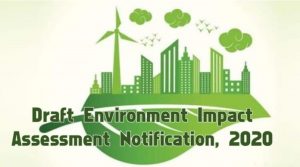Daily Current Affairs for Government Exams:
Today Current Affairs: 4th September 2020 for UPSC IAS exams, State PSC exams, SSC CGL, State SSC, RRB, Railways, Banking Exam & IBPS, etc
Table of Contents
Contents:
- GW190521:
- .Novichok :
- Quad grouping:
- G-20 Foreign Ministers Meet:
- Draft Environment Impact Assessment (EIA) notification 2020::
- Other important current affairs:
1.GW190521:

Billions of years ago, a collision between two black holes sent gravitational waves rippling through the universe.
- In 2019, signals from these waves were detected at the gravitational wave observatory LIGO (United States) and the detector Virgo (Italy).
- The discovery and analysis are described in two research papers published recently.
- GW190521 is a gravitational wave signal resulting from the merger of two black holes near a third supermassive black hole.
- The event was observed by the LIGO and Virgo detectors on 21 May 2019.
- The signal detected at LIGO and Virgo, as described by the LIGO Collaboration, resembled “about four short wiggles” and lasted less than one-tenth of a second.
- Gravitational waves are invisible ripples that form when a star explodes in a supernova; when two big stars orbit each other; and when two black holes merge.
- Traveling at the speed of light, gravitational waves squeeze and stretch anything in their path.
- Gravitational waves were proposed by Albert Einstein in his General Theory of Relativity over a century ago.
- It was only in 2015, however, that the first gravitational wave was actually detected — by LIGO. Since then, there have been a number of subsequent detections of gravitational waves.
2.Novichok :

Novichok, Germany says was used to poison Alexei Navalny, a critic of Russian President Vladimir Putin who is in a coma in a Berlin hospital.
Novichok:
- It was developed in the Soviet Union in the 1970s and 1980s.
- The name Novichok means “newcomer”. It is used for a family of highly toxic nerve agents.
- Novichok agents are believed to be five to 10 times more lethal than other poisonous substances like VX gas.
- The weaponization of any chemical is banned under the 1997 Chemical Weapons Convention, of which Moscow is a signatory.
- However, Moscow is not believed ever to have declared Novichok or its ingredients to the Hague-based Organisation for the Prohibition of Chemical Weapons (OPCW), which oversees a treaty banning their use.
Background:
- Novichok was added to the Chemical Weapons Convention’s list of controlled substances last year.
- This was the first time that the list was updated since it was agreed upon in the 1990s.
Chemical Weapons Convention:
- It is a multilateral treaty that bans chemical weapons and requires their destruction within a specified period of time.
- The CWC is implemented by the Organization for the Prohibition of Chemical Weapons (OPCW), which is headquartered in The Hague (OPCW won the 2013 Nobel peace prize).
- The CWC is open to all nations and currently has 193 states-parties. Israel has signed but has yet to ratify the convention.
- Three states have neither signed nor ratified the convention- Egypt, North Korea and South Sudan.
- The Chemical Weapons Convention prohibits:
- Developing, producing, acquiring, stockpiling, or retaining chemical weapons.
- The direct or indirect transfer of chemical weapons.
- Chemical weapons use or military preparation for use.
- Assisting, encouraging, or inducing other states to engage in CWC-prohibited activity.
- The use of riot control agents “as a method of warfare.”
3.Quad grouping:

Chief of Defence Staff Gen. Bipin Rawat has backed the ‘Quad’ as a “good mechanism” to ensure freedom of navigation in the Indian Ocean-Pacific region — a statement that could rile up China.
Quad grouping:
- The quadrilateral security dialogue includes Japan, India, United States, and Australia.
- All four nations find a common ground of being the democratic nations and common interests of unhindered maritime trade and security.
- The idea was first mooted by Japanese Prime Minister Shinzo Abe in 2007. However, the idea couldn’t move ahead with Australia pulling out of it.
- Quad is an opportunity for like-minded countries to share notes and collaborate on projects of mutual interest.
- Members share a vision of an open and free Indo-Pacific.
- Each is involved in the development and economic projects as well as in promoting maritime domain awareness and maritime security.
- It is one of the many avenues for interaction among India, Australia, Japan, and the US and should not be seen in an exclusive context.
4.G-20 Foreign Ministers Meet:

Saudi Arabia hosted the G-20 foreign ministers meeting with a focus on cross-border movement amid the Covid-19 pandemic.
- Currently, Saudi Arabia holds the presidency of G-20. It is the first Arab nation to take over the G20 Presidency.
Key Points
- The foreign ministers acknowledged the importance of opening borders and promoting measures to allow the economy to thrive in light of the protective measures for the Covid-19 pandemic.
- Many health safety protocols were brought in to minimize the risk of the spread of the Covid-19, like closed borders.
- However, they have now become a huge obstacle in running trade and businesses worldwide resulting in a crisis of life and livelihood for many.
- India apprised the G-20 foreign ministers about steps taken by India including the Vande Bharat Mission and the creation of travel bubbles for the welfare and protection of foreign citizens stranded in India as well as its own citizens abroad.
Recent Initiatives Taken by G-20:
- Earlier, in the 3rd G-20 Finance Ministers and Central Bank Governors (FMCBG) meeting held in July 2020, G-20 came up with the G20 Action Plan to deal with the pandemic.
- The Action Plan includes a list of collective commitments under the pillars of Health Response, Economic Response, Strong and Sustainable Recovery, and International Financial Coordination.
- The G-20 also organized a virtual meeting of G-20 Digital Economy Ministers to highlight the digital initiatives taken by the countries to deal with Covid-19.
G-20:
- The G20 is an informal group of 19 countries and the European Union, with representatives of the International Monetary Fund and the World Bank.
- The G20 membership comprises a mix of the world’s largest advanced and emerging economies, representing about two-thirds of the world’s population, 85% of global gross domestic product, 80% of global investment, and over 75% of global trade.
- The members of the G20 are Argentina, Australia, Brazil, Canada, China, France, Germany, India, Indonesia, Italy, Japan, Republic of Korea, Mexico, Russia, Saudi Arabia, South Africa, Turkey, the United Kingdom, the United States, and the European Union.
- It does not have any permanent secretariat or headquarters.
5.Draft Environment Impact Assessment (EIA) notification 2020::

A group of Special Rapporteurs to the United Nations (UN) has written to the Indian government expressing concerns over the draft Environment Impact Assessment (EIA) notification 2020.
- Special Rapporteurs are independent experts working on behalf of the UN. They work on a country or a thematic mandate specified by the United Nations Human Rights Council (UNHRC).
- The group has highlighted that the proposed notification appeared to have clauses that obstructed people’s rights to a safe, clean, and healthy environment.
- There are clauses which exempt several large industries and projects from the public consultation, as part of the Environmental Impact Assessment process.
- The draft notification provides for a reduction of the time period from 30 days to 20 days for the public to submit their responses during a public hearing for any application seeking environmental clearance.
- This time frame is inadequate for the preparation of views, comments, and suggestions, and without a meaningful public hearing, the whole EIA process would lack transparency and credibility.
- The draft notification does not require publication of information or holding of public consultation for projects labeled by the Central government as ‘involving strategic considerations’.
- The 2020 draft notification allows for post-facto approval for projects which means that the clearances for projects can be awarded even if they have started construction or have been running phase without securing environmental clearances.
- Post facto approval is the derogation of the fundamental principles of environmental jurisprudence and violation of the precautionary principle, which is a principle of environmental sustainability.
- The group has sought the government’s response to how the provisions of the notification are consonant with India’s obligations under international law.
- India is a party to the Rio declaration (also known as the Earth Summit) adopted by the United Nations Conference on Environment and Development (UNCED) in 1992, which articulated a catalog of environmental principles including sustainable development, precautionary principle, and EIA.
- Following the Rio Conference 1992, EIA became part of the formalized legal framework in India in 1994.
- India is also party to the Convention on Biological Diversity (CBD) and United Nations Framework on Climate Change (UNFCCC), which contain a requirement to have a prior EIA in situations having a significant threat to the environment.
Indian Government’s Response:
- The Environment Ministry Secretary has held that nothing in the proposed EIA, 2020 violates the UN Declaration of Human Rights and that the rapporteurs’ concerns are “misplaced”.
- The proposed EIA is still a draft and was issued for public consultation. The imperfections in the existing EIA would be amended in the new notification.
- With regard to post facto clearances, the violation of not taking prior approval would be punished as per law, and projects that are already running would be considered only on merit.
Other important current affairs:
1.8 immunity-boosting products launched under Pradhan Mantri Bhartiya Janaushadhi Priyojana (PMBJP) for sale through Janaushadhi Kendras across the country.
- About PMBJP:
- It is a campaign launched by the Department of Pharmaceuticals of the Ministry of Chemicals and Fertilizers to provide quality medicines at affordable prices to the masses through special kendra’s known as Pradhan Mantri Bhartiya Jan Aushadhi Kendra.
- Initially launched in 2008, the scheme was rechristened in 2015.
- Implementation:: Bureau of Pharma PSUs of India (BPPI) is the implementing agency of PMBJP.
2.NASA says asteroid 465824 2010 FR, which is twice as big as the Pyramid of Giza, may cross the Earth’s orbit on September 6.
- It is classified as a Near-Earth Object (NEO) and a potentially hazardous asteroid (PHA).
- NASA defines NEOs as comets and asteroids nudged by the gravitational attraction of nearby planets into orbits that allow them to enter the Earth’s neighborhood.
- These objects are composed mostly of water ice with embedded dust particles.
3. Turkey has announced that Russia will hold live-fire naval exercises in the eastern Mediterranean. This will happen during escalating tensions between Turkey and its coastal neighbors Greece and Cyprus over the right to search for energy resources in the region.
- Complex Geopolitics: Turkey is a North Atlantic Treaty Organization (NATO) member, and it is strange to expect NATO-member Turkey to engage such drills on Russia’s behalf.
- It can be noted that the two countries have in recent years significantly strengthened their military, political and economic ties.
- Apart from the announced drill, they are coordinating closely on their military presence in Syria.
- Turkey has purchased Russia’s advanced S-400 missiles and has agreed to go with a Russian-built nuclear power plant on its southern coast.
- Reasons:
- Recently, the U.S. lifted a decades-old arms embargo (1987) on Cyprus which created the fresh strains between Turkey and Greece.
- Turkey condemned the move and urged the USA to reverse course to safeguard Turkish-speaking Cypriots.
- The Embargo: To prevent an arms race that would hinder UN-facilitated reunification efforts for Cyprus.
- It was directed against the southern, Greek Cypriot part of the island, where Cyprus’ internationally recognized government is seated.
4. The Supreme Court refused to stay the Andhra Pradesh High Court’s order striking down the state government’s decision to make English the medium of education for government school students from Classes I to VI beginning 2020-21 academic year.
- The Court pointed out that Section 29(2)(f) of the Right to Education (RTE) Act, 2009 says that the medium of instruction shall, as far as practicable, be in a child’s mother tongue.
- Constitutional and Legal Provisions:
- Article 29 (Protection of interests of minorities) gives all citizens the right to conserve their language and prohibits discrimination on the basis of language.
- Article 120 (Language to be used in Parliament) provides for use of Hindi or English for transactions of parliament but gives the right to members of parliament to express themselves in their mother tongue.
- Part XVII of the Indian Constitution deals with the official languages in Articles 343 to 351.
- Article 350A (Facilities for instruction in mother-tongue at the primary stage) provides that it shall be the endeavor of every State and of every local authority within the State to provide adequate facilities for instruction in the mother-tongue at the primary stage of education to children belonging to linguistic minority groups.
- Article 351 (Directive for development of the Hindi language) provides that it shall be the duty of the Union to promote the spread of the Hindi language.
- The Eighth Schedule recognizes the following 22 languages as official languages: Assamese, Bengali, Gujarati, Hindi, Kannada, Kashmiri, Konkani, Malayalam, Manipuri, Marathi, Nepali, Oriya, Punjabi, Sanskrit, Sindhi, Tamil, Telugu, Urdu, Bodo, Santhali, Maithili and Dogri.
- Right to Education (RTE) Act, 2009 says that the medium of instruction shall, as far as practicable, be in a child’s mother tongue.
5. According to a recent study by researchers from the University of Queensland (UQ), Australia, more life can be supported by dead coral remains than live corals.
- Dead coral reefs support cryptic organisms like hidden sea creatures, including fishes, snails, tiny crabs, and worms, who hide under its rubble to save themselves from predation. The researchers designed three-dimensional-printed coral stacks called RUbble Biodiversity Samplers (RUBS) to survey cryptic organisms.
- The 3D-printed coral mimicked surrounding reef rubble and invited unwitting reef organisms to be monitored.
- By sampling the RUBS’ structures over time, the team was able to identify changes in the cryptic population.
- Findings: The researchers found the missing link in the coral reef food webs. This data fills important knowledge gaps, such as how small cryptic animals support coral reefs from the bottom of the food chain, all the way up to bigger predators.
- This also helped to know the importance of dead coral reef rubble to the ocean ecosystem.
- RUBS technology provides a new opportunity for reef management, particularly for reef education and awareness.
- Coral Reefs:
- Coral reefs are large underwater structures composed of the skeletons of colonial marine invertebrates called coral.
- Corals extract calcium carbonate from seawater to create a hard, durable exoskeleton that protects their soft, sac-like bodies. These exoskeleton remains of millions of corals pile up with time to form coral reefs.
6. Atlantic Hurricane Nana has made landfall on the coast of Belize.
- The country Belize is located on the northeast coast of Central America.
- A few days back, Hurricane Laura made landfall in southwestern Louisiana (South Central United States)
7. The Prime Minister of India delivered the keynote address at the 3rd Annual Leadership Summit of US-India Strategic Partnership Forum (USISPF).
- Established: The USISPF is a non-profit organization established in 2017.
- Objective: Strengthening the USA-India bilateral and strategic partnerships.
- Aim: Strengthening economic and commercial ties between the two countries through policy advocacy that will lead to driving economic growth, entrepreneurship, employment-creation, and innovation to create a more inclusive society.
- Enabling business and governments to collaborate and create meaningful opportunities that can positively change the lives of citizens.
- The theme for 2020: US-India Navigating New Challenges.
- Economic Relations: In 2019, overall USA-India bilateral trade in goods and services reached USD 149 billion
8.Mizoram Chief Minister Zoramthanga has asked the Assam Rifles to shift its base from the heart of State capital Aizawl to Zokhawsang about 15 km away at the earliest.
- The stand-off between the Mizoram government and the Assam Rifles began on August 18, when 15 personnel of the force’s 46th Battalion allegedly forced their way into the State ignoring COVID-19 safety protocols.
- Previously, The Mizo National Front government had in 1988 asked the Assam Rifles to shift from Aizawl after the killing of 12 civilians in an “encounter”.
- Assam Rifles:
- Assam Rifles which is also referred to as the Sentinels of North East is the oldest paramilitary force of India.
- It was formed as a single unit called Cachar Levy in 1835 to assist the British rulers in maintaining peace in the Northeast.
- Incremental gains were accompanied by name changes for the primary law enforcement agency – Assam Frontier Police to Assam Military Police to Eastern Bengal to Assam Military Police – before Assam Rifles became the official name in 1917.
- It served in both the World Wars.
9. The trial run on the new river route from Daudkandi in Bangladesh to Sonamura in Tripura started as the MV Premier sailed from Daudkandi with 50 metric tonnes of cement cargo.
- It is scheduled to arrive in Sonamura in Tripura after covering a distance of 93 kilometers through the river Gumti.
- The route will connect Tripura with Bangladesh using the inland waterways for the first time.
- This is yet another recent connectivity initiative with Bangladesh, which will greatly enhance connectivity between Bangladesh and the North-Eastern states of India boosting bilateral trade with Bangladesh.
- The opening of the new route follows the signing of the 2nd addendum to the Protocol for Inland Water Trade & Transit (PIWTT) in May 2020 which opened two new routes.
- The PIWTT was signed between India and Bangladesh in 1972 to connect the two countries through inland waterways.




